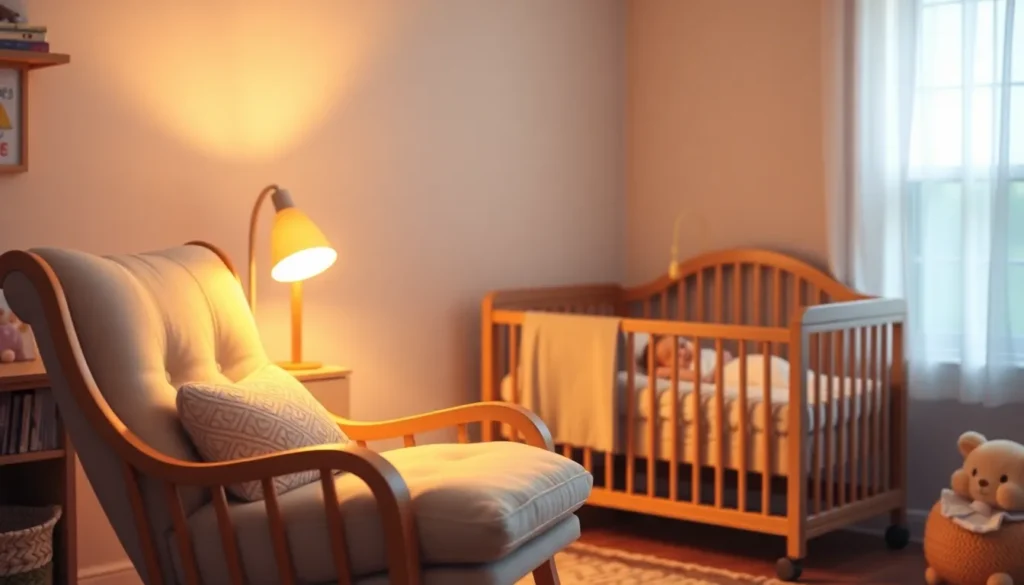Table of Contents
ToggleWhen it comes to calming a fussy baby, soothing music might just be the magical potion every parent needs. Forget about the endless rocking and the desperate attempts at lullabies that sound more like a cat in distress. The right tunes can transform bedtime from a battlefield into a serene sanctuary.
Imagine a world where your little one drifts off to dreamland with the gentle sounds of lullabies or soft instrumental melodies. Not only does soothing baby music create a peaceful atmosphere, but it also promotes better sleep and relaxation for both baby and parents. It’s like having a personal sleep coach, minus the hefty fee and awkward small talk. Dive into the world of calming sounds and discover how they can help create a harmonious home for everyone involved.
Importance Of Soothing Baby Music
Soothing baby music plays a vital role in nurturing a calm environment. It helps in both emotional and cognitive development.
Benefits For Baby’s Development
Soothing music stimulates auditory development. Babies exposed to calming sounds show improved language skills. Additionally, engaging melodies promote emotional responses, fostering attachment between parents and infants. Music encourages brain activity and enhances memory recall. Simple tunes create a sense of security, aiding in exploration and learning.
Effects On Sleep Patterns
Soothing music significantly influences sleep patterns. It reduces the time babies take to fall asleep, creating a more predictable bedtime routine. Consistent exposure leads to longer sleep durations throughout the night. Soft melodies help establish a sleep cue, signaling to infants that it’s time to relax. Overall, calming music cultivates a healthy sleep environment, benefiting both babies and parents with restful nights.
Types Of Soothing Baby Music

Soothing baby music comes in various forms, providing parents with options to create a calming environment. Each type offers unique benefits for infants.
Lullabies
Lullabies feature gentle melodies, often with repetitive structures. These simple tunes help babies recognize patterns, fostering early cognitive skills. Many lullabies use soft vocals, making them comforting for infants. Traditional lullabies from different cultures can introduce diverse sounds and rhythms. Choosing a familiar lullaby can also strengthen the bond between parent and child.
Nature Sounds
Nature sounds include gentle rain, flowing water, and rustling leaves. These organic sounds mimic the soothing ambiance found in the womb. Nature sounds often help reduce anxiety levels in babies, promoting relaxation. Continuous ocean waves or bird songs can create a serene atmosphere, aiding sleep. Many parents find nature sounds effective for establishing bedtime routines.
Classical Music
Classical music offers calming compositions with rich harmonies. Works by composers such as Mozart and Beethoven can stimulate brain development in infants. Classical pieces provide soothing rhythms and can improve focus during quiet activities. Regular exposure to classical music often promotes a calming effect, encouraging longer sleep durations. Slow movements are particularly beneficial for creating a peaceful environment.
How To Choose Soothing Baby Music
Selecting the right soothing baby music involves understanding developmental needs and creating a peaceful atmosphere. Different factors influence the choice, like the baby’s age and personal preferences.
Consider The Baby’s Age
Age plays a crucial role in music selection. Infants respond well to soft lullabies with gentle melodies, as these sounds seem familiar and comforting. As babies grow, they might enjoy more varied music styles, such as classical pieces or simple nature sounds. One-year-olds often appreciate rhythm in music, while toddlers may favor songs with engaging lyrics that encourage interaction. Parents aiming to nurture auditory development should select music that aligns with their child’s growth stage.
Personal Preferences
Personal preferences can significantly impact a baby’s receptiveness to music. Babies often react positively to what their parents enjoy listening to, creating a shared experience. Mixing up genres, from traditional lullabies to ambient sounds, helps identify what resonates best. Observing a baby’s reactions—like smiling or calming—can guide parents in making the right choices. Trying out various options ensures that the picked soothing music contributes to a harmonious bedtime routine.
Tips For Playing Soothing Baby Music
Setting the right atmosphere enhances the effects of soothing baby music. Creating a calming environment allows babies to relax better and respond positively to music.
Creating A Calm Environment
Dim lighting can help create a serene space, making babies feel secure. Soft textures like blankets and plush toys contribute to comfort and coziness. Additionally, eliminating distractions such as bright screens and loud noises allows babies to focus on the music. Using calming scents, such as lavender, can also promote relaxation. Parents can play the music near the baby’s sleeping area to help connect the cues of sound with sleep, enhancing the effectiveness of the soothing tunes.
Timing And Duration
Optimal timing plays a crucial role in the effectiveness of soothing music. Playing music during a baby’s wind-down routine prepares them for sleep. It’s best to choose specific times, such as before naps or bedtime, to establish consistency. Duration matters too; keeping sessions between 20 to 30 minutes maintains a peaceful atmosphere without overwhelming the baby. Parents can observe their baby’s cues for signs of relaxation and adjust the playtime accordingly. Testing different lengths helps determine what works best for each child.
Soothing baby music serves as a powerful tool for creating a calm and nurturing environment. By incorporating gentle melodies and calming sounds into bedtime routines, parents can significantly enhance their baby’s sleep experience. This practice not only promotes relaxation but also supports emotional and cognitive development.
As parents experiment with different types of music, they can discover what resonates best with their little ones. Observing their baby’s reactions allows for a tailored approach, ensuring that the music chosen fosters a peaceful atmosphere. Ultimately, the right soothing music can transform bedtime from a challenge into a serene ritual, benefiting both babies and parents alike.







